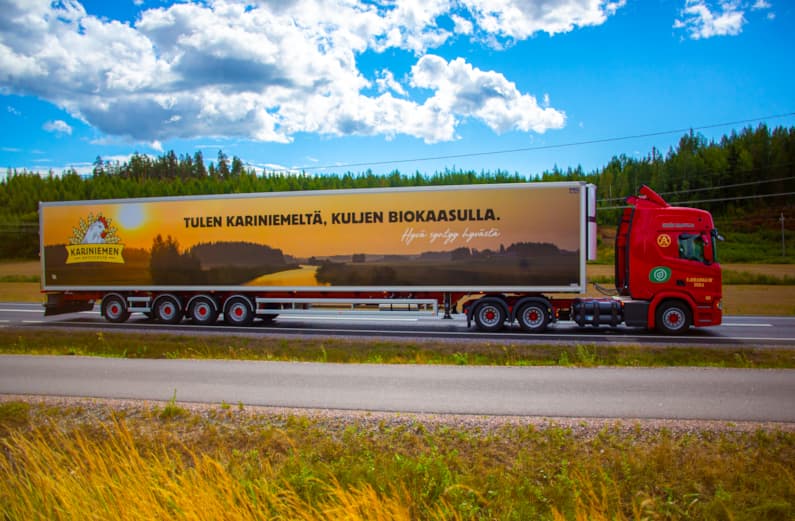HKScan is determinedly looking for ways to reduce carbon dioxide emissions in different parts of the food chain. The biogas truck introduced in summer 2021 in Finland for distribution transport in the capital region is part of this aim and at the same time, an example of efficient use of biomaterials. The change in climate emissions from distribution transport is significant as a truck using biogas as fuel reduces CO\2e\ emissions by up to 90% compared to a conventional diesel vehicle.
HKScan’s goal is a carbon-neutral food chain by the end of 2040. This is targeted and the work is led through the company’s Zero Carbon climate plan that addresses all aspects of the food chain to reduce carbon dioxide emissions - including transport. Thanks to the long-term climate work in HKScan’s Business Unit Finland, we believe we will reach our goal in Finland earlier – by the end of 2035.
“A recent example of reducing emissions is Kuljetusliike Y. Auramaa Oy’s low-emission biogas truck that carries out HKScan’s product transports from Vantaa logistics centre to the customer terminals in the capital region,” says Jari Leija, HKScan’s EVP Business Unit Finland.
The semitrailer combination truck introduced in the summer 2021 has a maximum length of 22.5 metres, which also increases environmental efficiency. More goods can be loaded on board at a time, allowing more efficient transport optimisation and reducing the need to drive back and forth.

Emissions from distribution transports minimised with biogas
“It’s great to be able to help our major customer towards its goal of a carbon-neutral food chain. Biogas is a low-emission fuel option for heavy vehicle traffic. CO2e emissions from a truck using biogas as fuel are up to 90% lower than from a conventional diesel vehicle,” says Pekka Auramaa, Chairman of the Board at Kuljetusliike Y. Auramaa Oy.
HKScan has also introduced biogas trucks in Latvia as well as in Sweden where the company transports its products between Kristianstad and Halmstad.
Biowaste recovered in biofuel production
Material efficiency is important. For HKScan, it means, for example, reducing production losses and food waste, utilising by-product material flows and promoting the recyclability of packaging. By efficiently utilising materials, the company can significantly reduce its environmental impact. For this reason, HKScan has already for several years recycled materials of animal origin that cannot be used in food production to biofuel production.
“We utilise our raw materials carefully and direct production by-products as efficiently as possible to other industries, such as the leather, feed or pet food industries, and animal materials not suitable for foods to biofuel production,” Leija continues.
Read more:
- Targeting carbon-neutral food production in 2040
More information:
HKScan Media Service Desk, tel. +358 10 570 5700 or email: communications@hkscan.com
At HKScan, we make life tastier – today and tomorrow. Our strategic target is to grow into a versatile food company. Our responsibly produced, delicious products are part of consumers’ varied food moments – both every day and on special occasions. We have some 7,000 HKScan professionals applying more than 100 years of experience to make locally produced food. For us at HKScan, responsibility means continuous improvements and concrete actions throughout the food chain. As part of our Zero Carbon programme, we are targeting a carbon-neutral food chain from farms to consumers by the end of 2040. Our home markets cover Finland, Sweden, the Baltics and Denmark. Our strong product brands include HK®, Kariniemen®, Via®, Scan®, Pärsons®, Rakvere®, Tallegg® and Rose™. Through our strategic partnerships, we are also known for Kivikylän®, Tamminen® and Boltsi brands. HKScan is a publicly listed company, and in 2020, our net sales totalled nearly EUR 1.8 billion.





